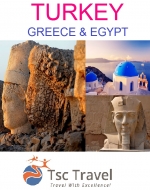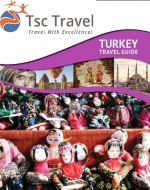TURKEY TRAVEL TIPS
Visa & Border Formalities
Most visitors buy a “sticker visa” at the airport, maritime port, or border-crossing point. Ensure your passport is valid for at least 90 days until the expiration date or you may not be admitted.
You can obtain your visa in advance; before you arrive in Turkey, from any Turkish consulate, but it entails time, trouble, and extra expense (you’ll pay a “visa processing fee.”) Although it costs slightly more money, you can avoid queues by purchasing an e-visa
Currency & Money Exchange
The currency used in the country is Turkish Lira and available in the following denominations: Banknotes: 5,10,20,50,100 and 200 TL Coins: 1, 5, 10, 25 & 50 kurus and 1 TL. Usually, cash can be exchanged without charging commission in exchange offices, banks or hotels. Cash point machines (ATM) are available in most areas, which accept major European credit and cards and give instructions in English.
It may be a good idea to inform your bank in advance that you are travelling to Turkey as some will automatically put a stop on cards after the first usage in an attempt to combat fraud. Exchange rates are published daily in Turkish newspapers and the internet.
If you are planning to exchange currency back from TL before leaving the country, or are making a major purchase, which may need to be declared to customs, you will need to keep your transaction receipts in order to show that the currency has been legally exchanged.
Voltage
Working Hours & Public Holidays
Offices and banks are generally open from 9:00 AM to 5:00 PM from Monday to Friday, with a break between 10:00 to 1:30 PM. Touristic shops, restaurants and bars usually open till late night.
Official holidays are ;
• Apr 23 National Sovereignty and Children’s Day
• May 19 Ataturk Commemoration and Youth & Sports Day
• Aug 30 Victory Day (victory over invading forces in 1922)
• Oct 29 Republic Day (anniversary of the declaration of the Turkish Republic)
Please note : The dates of the following two religious festivals change according to the Muslim lunar calendar and thus occur 10 days earlier each year.
• Ramazan Bayrami / Sugar Feast :Three-day festival when sweets are eaten to celebrate the end of the fast of Ramazan.
• Kurban Bayramı / Sacrifies Feast :Four-day festival when sacrificial sheep are slaughtered and their meat distributed amongst the poor, neighbours and within the family
Internet
Most hotels, inns, pensions and hostels either have a computer dedicated to the Web and email for guests’ use, or the owner will allow you to use an office computer. If you travel with your own laptop computer, most hotels, particularly the small and medium-sized ones—offer fast (ADSL) wireless Internet access (Wifi) in at least one public space, such as the lobby or lounge.
More and more hotels have repeaters that convey the signal to all the guest rooms as well. Wifi access is usually free in smaller hotels and inns. Even cave rooms in Cappadocia and tree houses in Olympos on Turkey’s Mediterranean coast have Internet connections.
Cafes and some restaurants in the largest cities are also setting up Wifi access for their customers. Major Turkish airports have Wifi. You may have to ask the hotel staff for the password to access their system. Virtually all luxury hotels have Ethernet ports (RJ-45) for high-speed connections.
Laundy
Laundry service at “formal” hotels in Turkey (luxury, five-star, four-star and even some three-star) can cost nearly as much as some garments are worth (underwear, etc). In less formal hotels (inns, small hotels, pensions, hostels), the service is usually much better and far cheaper.
Sometimes you just hand your laundry to the housekeepers and it comes back cleaned and pressed, often the same day, for not much money. Some pensions, inns and hostels have washing machines that guests can use, either for free or for a small fee.
There are not many Laundromat /launderettes/ washaterias in Turkey, so that’s usually not an option. Dry cleaning shops are scattered throughout most cities. Ask at your hotel for one nearby. Same-day service is available at many shops (for an extra charge) if you delivery your garments first thing in the morning.
Visiting a mosque
Health & Insurance
Driving in Turkey
You can drive in Turkey with an international driving license. You should have a copy of this, together with your passport and insurance documents with you in the car at all times, as you will need it if you are involved in an accident.
All of the major international car rental companies, as well as a number of local ones, have offices at airports and all major centers. Driving in Turkey is on the right, as in continental Europe. Turkish road signs conform to the International Protocol on Road Signs and archaeological and historic sites are indicated by yellow signs.
Turkey has a good network of well-maintained roads. There is a 50 km per hour speed limit within urban centers and 90 km outside urban centers. Petrol stations are fairly easy to rind and on main highways, they are often open 24hrs and have restaurants and other facilities attached. Unleaded (kursunsuz) petrol is easily available.
On Exit
For valuable gifts and souvenirs, such as a carpet, proof of purchase is necessary, together with receipts showing that any currency used in its purchase has been legally exchanged. Please note that it is strictly forbidden to export antiques from Turkey. Minerals can only be exported with a special document.
There is no limit to the amount of foreign and Turkish currency to be brought into Turkey. Up to US$5000 worth of Turkish or foreign currency can be taken out of the country, providing that it can be shown that the currency has been obtained from authorized banks. Larger amount of foreign or Turkish currency must be transferred abroad through banks.
Further Reading
About Turkey : Basic facts, history and climate
Tour Packages throughout the country : Including Istanbul, Cappadocia, Ephesus, Pamukkale and the Black sea


